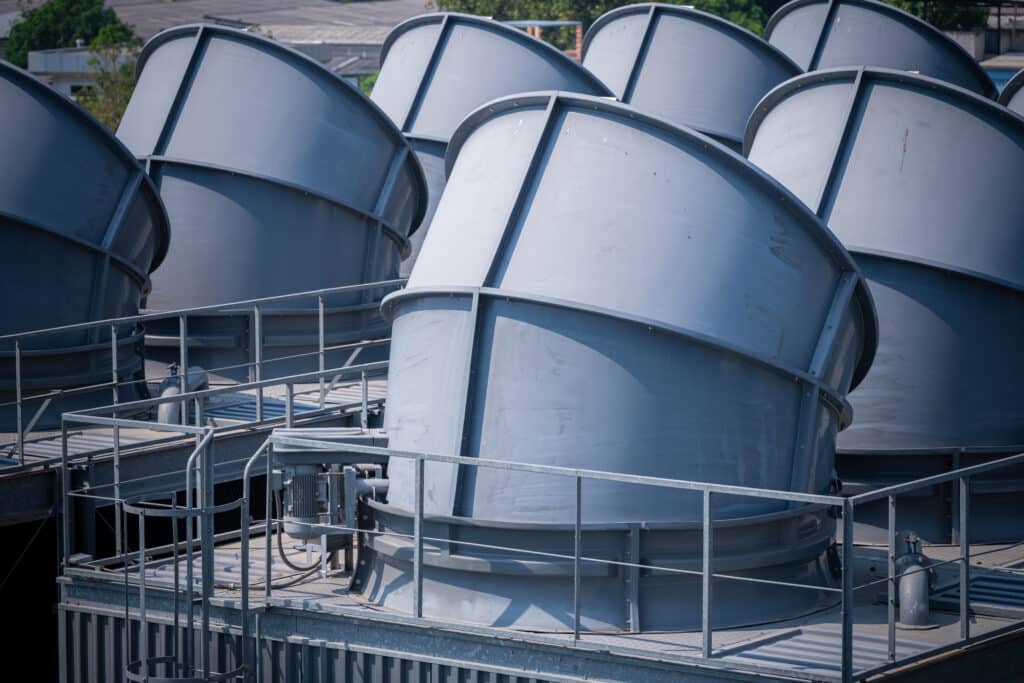Air-Cooled Chillers
Do You Need a Chiller and a Cooling Tower?
Chillers are fundamental components in numerous industrial applications, as they provide critical temperature control and efficient cooling mechanisms. However, some businesses may be interested in combining their chillers with cooling towers to enhance their cooling systems.
Cooling towers are highly efficient devices that can be used together with chillers for larger, more complex applications. This combination allows businesses to leverage the benefits of both chillers and cooling towers—increased power efficiency, improved safety, and reduced installation costs.
Do your clients need chillers, cooling towers, or both? This resource will help you determine whether a chiller and cooling tower are the best solution for your customer’s needs.
A Brief Overview on the Role of Chillers
Chillers are essential cooling devices used in various industries, from HVAC systems to manufacturing and healthcare. Their primary role is to regulate and maintain specific temperatures, which ensures the efficient operation of processes and equipment.
Chillers operate on the principles of heat exchange and refrigeration. They contain a refrigerant fluid that circulates through a closed system. In the evaporator, this fluid absorbs heat from its surroundings, causing it to evaporate and cool the target area.
The compressor then raises the temperature and pressure of the refrigerant, which releases the absorbed heat in the condenser. Afterward, an expansion valve allows the refrigerant to rapidly expand and cool down, restarting the cycle.
Chillers are crucial for precise temperature control in critical applications such as medical facilities, research labs, and industrial processes. They efficiently remove excess heat, prevent equipment overheating, and contribute to environmental control in HVAC systems.
Chillers come in two primary configurations: air-cooled and water-cooled. Air-cooled chillers are well-suited for scenarios where water availability is restricted, whereas water-cooled chillers excel in industries with continuous, high-capacity cooling requirements.
By harnessing the principles of heat exchange and refrigeration, chillers play a vital role in maintaining temperature stability in various settings, ensuring productivity, product quality, and comfort.
When Should One Use a Chiller?
Chillers can provide a comfortable, safe environment for workers and equipment in various industries, particularly healthcare (such as to cool MRIs), food production, and pharmaceuticals.
Precise Temperature Control
In several industries, such as medical facilities, precision research laboratories, and advanced food packaging, maintaining an exceptionally precise and consistent temperature is of paramount importance.
Chillers offer a unique capability to achieve and sustain the specific temperature levels required, which ensures the quality, safety, and integrity of sensitive processes and products.
Lower Temperature Applications
Certain industrial processes, most notably in the domains of food processing and pharmaceuticals, necessitate meticulously controlled low-temperature environments.
Chillers play an indispensable role in establishing and maintaining these controlled cold conditions, promoting the efficacy of processes and the preservation of perishable products.
Variable Load Demands
Industries characterized by fluctuating cooling demands, such as data centers or manufacturing facilities, benefit significantly from chillers.
Chillers are highly adaptive and can efficiently modulate their cooling output to accommodate variable load profiles. This adaptability optimizes energy consumption and operating costs while producing consistent temperature regulation.
When to Use a Cooling Tower
Cooling towers are specifically designed to reject heat to the atmosphere. They use the process of evaporative cooling, wherein a flow of water is sprayed through a series of nozzles and broken up into droplets.
As these droplets pass through the air stream, they absorb energy from the surrounding environment while simultaneously reducing their own temperature. This allows them to reject heat effectively, releasing cool air back to their surroundings.
Heat Dissipation
In specific applications like power plants and industrial processes, the primary objective is efficient heat dissipation. Cooling towers are expressly designed for this purpose, as they remove excess heat generated by various processes and equipment.
They excel in transferring heat to the surrounding environment, which makes them ideal for applications that prioritize heat rejection.
Cost-Efficiency
In large-scale HVAC systems and industrial settings, cooling towers represent a cost-effective solution. Their inherent ability to handle substantial cooling loads, often with lower energy consumption than alternatives, makes them an economically sound choice for cooling large facilities. They contribute to cost savings while ensuring adequate temperature control.
Evaporative Cooling
Regions characterized by high ambient temperatures, particularly arid climates, benefit significantly from evaporative cooling towers. These towers leverage the cooling effect of water evaporation to maintain efficient cooling, even in scorching conditions. They are particularly effective in climates where dry and hot conditions prevail.
The Benefits of Chiller and Cooling Tower Systems Integration
The integration of both chiller and cooling tower systems offers synergistic advantages in applications with varying cooling needs. This combination optimizes energy utilization and maintains precise temperature control, which provides operational efficiency gains.
Factors to Consider When Selecting Both Systems
System Compatibility
When contemplating the deployment of both chiller and cooling tower systems, it is crucial to ensure compatibility between these components. The selected systems must work seamlessly together to maximize efficiency and performance. Engineering expertise is often necessary to harmonize these systems effectively.
Maintenance Requirements
Regular maintenance is imperative for both chillers and cooling towers to sustain their peak performance. Manufacturers like KKT Chillers offer certified technicians who are experts in crafting, maintaining, and optimizing these systems. Routine maintenance not only prevents costly downtime but also ensures the longevity of the equipment.
Energy Efficiency
In today’s eco-conscious landscape, energy-efficient equipment choices are paramount. The selection of efficient chillers and cooling towers can significantly reduce operational costs and environmental impact. Energy-efficient components minimize waste and promote sustainability in industrial processes.
Trust KKT Chillers for Your Chilling Solutions
KKT Chillers distinguishes itself in the industry by offering high-quality German-engineered chillers tailored to a diverse array of applications and industries. Their exclusive reliance on highly skilled technicians who specialize in crafting, maintaining, and servicing their chillers ensures unmatched reliability and efficiency.
Request a free quote today to experience firsthand the precision and excellence that KKT Chillers’ products bring to temperature control and cooling solutions.
